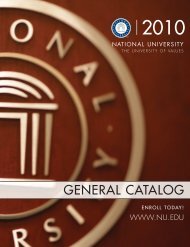Journal of Research in Innovative Teaching - National University
Journal of Research in Innovative Teaching - National University
Journal of Research in Innovative Teaching - National University
Create successful ePaper yourself
Turn your PDF publications into a flip-book with our unique Google optimized e-Paper software.
Introduc<strong>in</strong>g Relevant Social Issues as Examples<br />
<strong>in</strong> the Counsel<strong>in</strong>g Classroom: The Impact <strong>of</strong> a Volatile Political<br />
Environment and a Therapeutic Solution<br />
Brian Tilley<br />
Abstract<br />
The value <strong>of</strong> us<strong>in</strong>g real-world, relevant sociopolitical issues as classroom examples <strong>in</strong> a counsel<strong>in</strong>g tra<strong>in</strong><strong>in</strong>g program<br />
is discussed. <strong>Research</strong> support<strong>in</strong>g the concept is presented. The author outl<strong>in</strong>es a therapeutic tra<strong>in</strong><strong>in</strong>g-based method<br />
for <strong>in</strong>tegrat<strong>in</strong>g relevant examples drawn from politics and society <strong>in</strong> a way <strong>in</strong>tended to reduce the likelihood <strong>of</strong><br />
negative effects on the students and <strong>in</strong>crease the number <strong>of</strong> learn<strong>in</strong>g opportunities for them. An <strong>in</strong>stance <strong>in</strong> which the<br />
author used a political issue as an example for classroom discussion is provided, along with recommendations for<br />
future use.<br />
Key Words<br />
Society, examples, classroom discussion, politics, counsel<strong>in</strong>g psychology<br />
Introduction<br />
Studies have shown the effectiveness <strong>of</strong> the use <strong>of</strong> relevant real-world examples <strong>in</strong> the classroom<br />
as measured by subject-specific test results or <strong>in</strong>structor reports (e.g., Boaler, 1997; Bouillion &<br />
Gomez, 2001; Wu, 2003; Lee, 2004; Br<strong>in</strong>son, Brew, & Denby, 2008). <strong>Research</strong>ers have also<br />
found support for the idea that students prefer the use <strong>of</strong> examples from current society as a<br />
teach<strong>in</strong>g or illustrative tool (e.g., Merta, Str<strong>in</strong>gham, & Ponterotto, 1988; Glenwick & Chabot,<br />
1991; Lak<strong>in</strong> & Wichman, 2005). Students <strong>in</strong> <strong>National</strong> <strong>University</strong>’s Master <strong>of</strong> Arts <strong>in</strong> Counsel<strong>in</strong>g<br />
(MAC) program have demonstrated through personal communication, as well as measurable data<br />
<strong>in</strong> the form <strong>of</strong> teacher evaluations, their preference for current, relatable examples <strong>in</strong> the type <strong>of</strong><br />
tra<strong>in</strong><strong>in</strong>g provided by the program.<br />
The MAC program teaches students not only to be ethical therapists but also to recognize<br />
places, people, and situations <strong>in</strong> need <strong>of</strong> help. As a result, the examples used <strong>in</strong> the classroom<br />
may relate to the <strong>in</strong>tersection <strong>of</strong> therapeutic treatment and current social issues. For example, a<br />
classroom discussion may be built upon the unique requirements <strong>of</strong> and demand for treatment <strong>of</strong><br />
return<strong>in</strong>g war veterans. However, today’s political environment lends itself to heated debate. The<br />
content on numerous 24-hour news channels, news websites (both ma<strong>in</strong>stream and alternative),<br />
and copious forums for political expression available via the Internet <strong>in</strong>dicate that us<strong>in</strong>g a<br />
relevant political example <strong>in</strong> the classroom might draw a variety <strong>of</strong> responses, <strong>in</strong>clud<strong>in</strong>g some<br />
negative and perhaps a few verg<strong>in</strong>g on revolt.<br />
The paper is (a) an exploration <strong>of</strong> the reason<strong>in</strong>g beh<strong>in</strong>d the use <strong>of</strong> politically relevant<br />
examples <strong>in</strong> the classroom and (b) a proposal for one method used <strong>in</strong> psychologist tra<strong>in</strong><strong>in</strong>g that<br />
could be effective <strong>in</strong> <strong>in</strong>troduc<strong>in</strong>g and discuss<strong>in</strong>g the issues. First, because therapists are <strong>in</strong> the<br />
unique position to help society one person at a time, they have a duty to be aware <strong>of</strong> the contexts<br />
<strong>in</strong> which those <strong>in</strong>dividuals operate and the effects <strong>of</strong> these contexts—i.e., today’s sociopolitical<br />
climate. Avoid<strong>in</strong>g controversial social issues discourages the critical psychological th<strong>in</strong>k<strong>in</strong>g<br />
espoused by the MAC program. Instructors should lead by example by show<strong>in</strong>g social and<br />
80

















